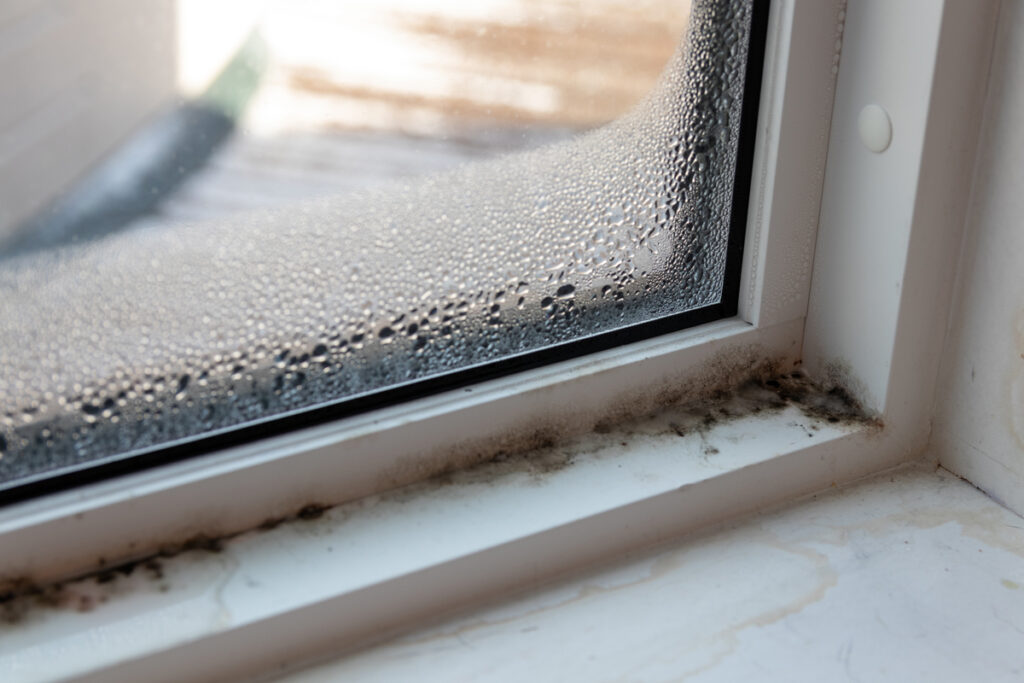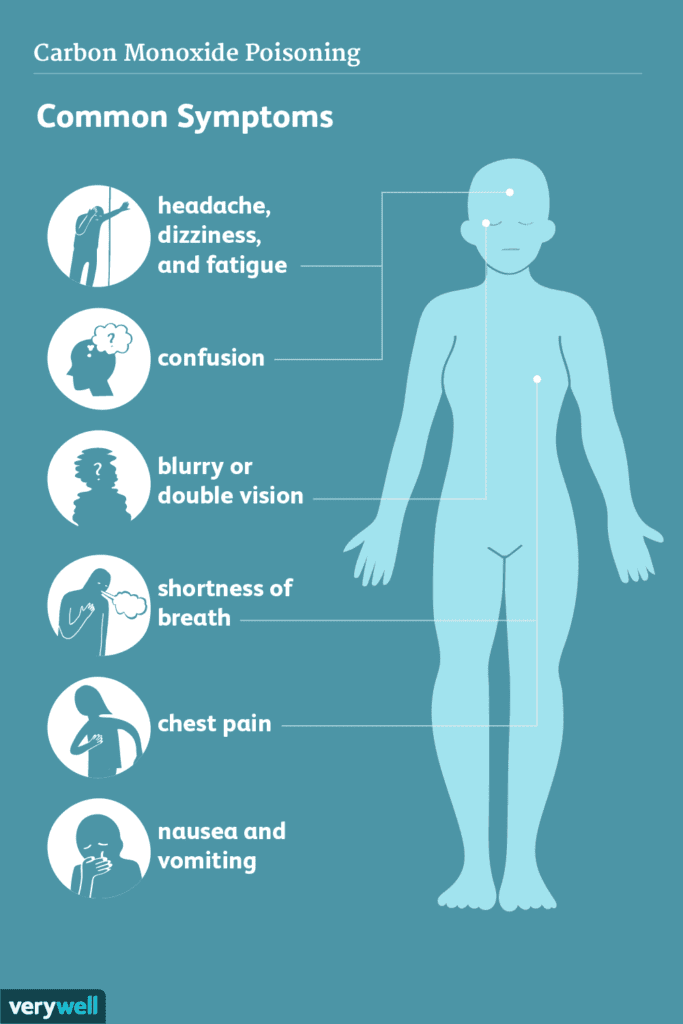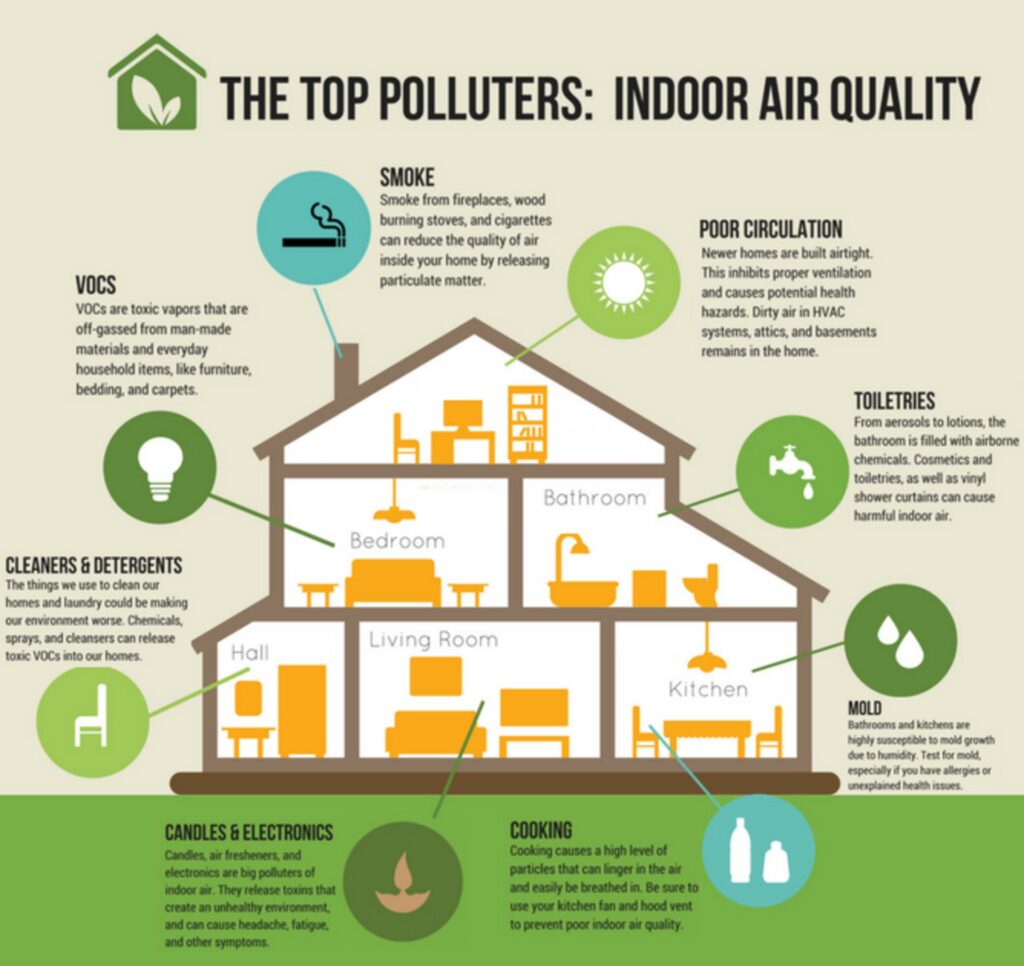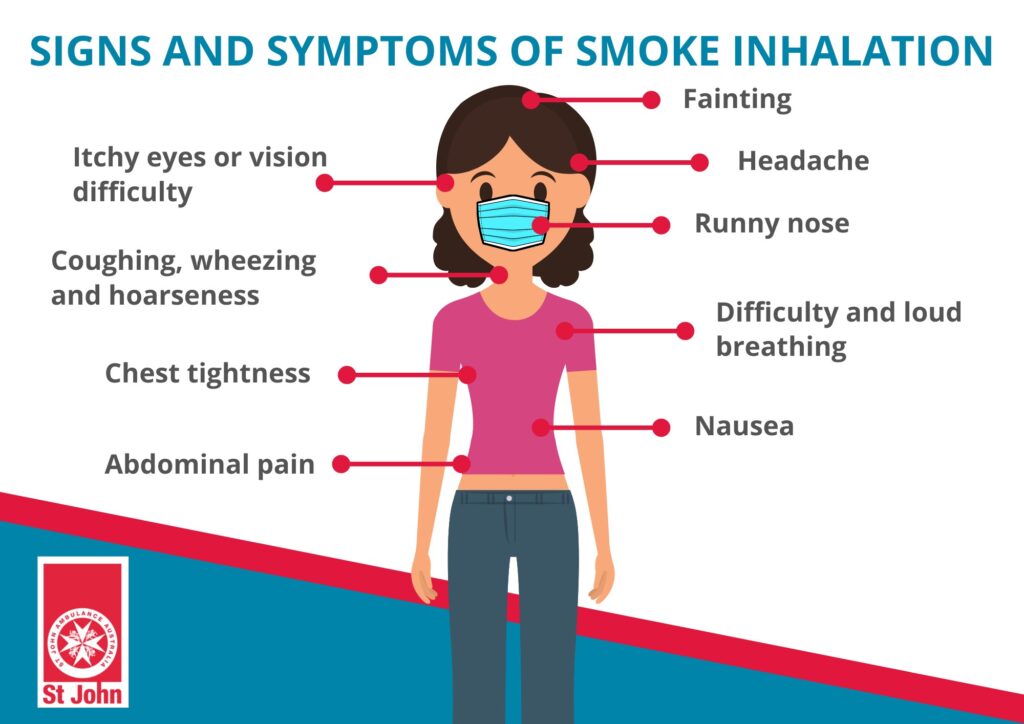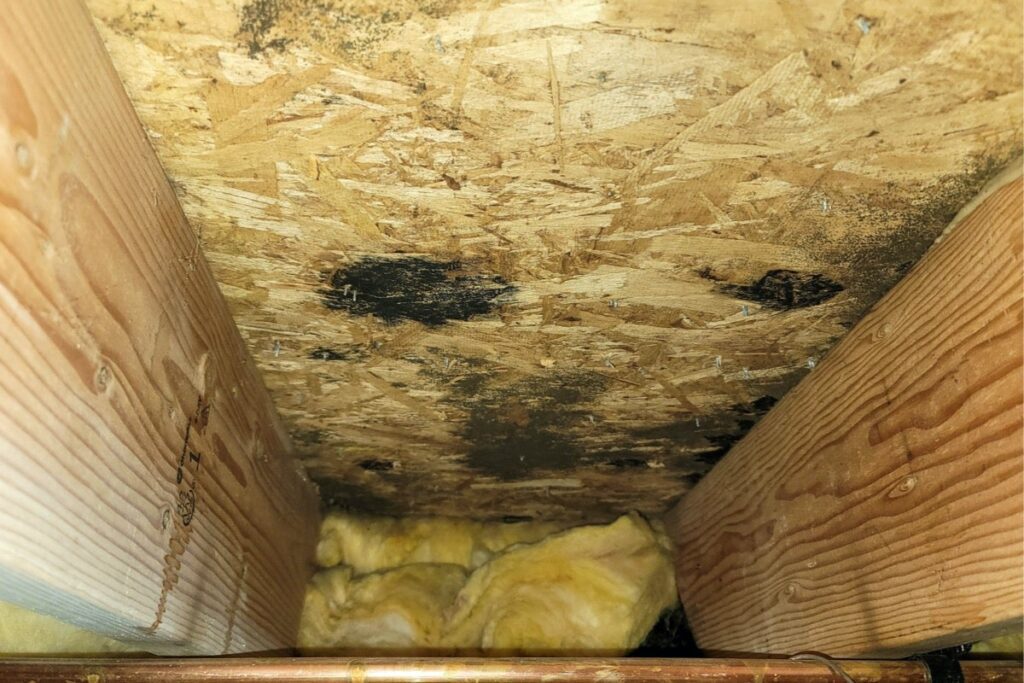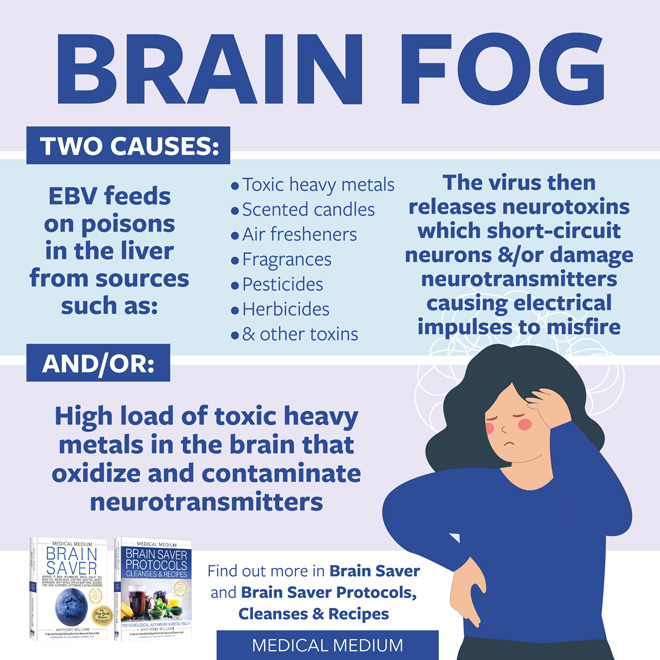Have you ever noticed a musty smell in your home or workplace? Or experienced unexplained respiratory symptoms, such as coughing or wheezing? These could be signs that mold is making you sick.
Mold is a type of fungus that can grow in damp environments, such as bathrooms, kitchens, and basements. When mold spores are released into the air, they can be inhaled and cause health problems, particularly in individuals with mold sensitivity.
In this section, we will explore the symptoms of mold exposure and how to recognize early signs of mold-related illness. By understanding the health effects of mold, you can take steps to protect yourself and your family from potential harm.
Key Takeaways:
- Mold is a fungus that grows in damp environments.
- Mold spores can cause respiratory symptoms and other health problems.
- Individuals with mold sensitivity are particularly at risk.
Understanding Mold Exposure
If you’ve been experiencing unexplained symptoms, it’s possible that mold exposure is the culprit. Mold is a type of fungus that grows in damp and humid environments, such as bathrooms, kitchens, and basements. When inhaled or ingested, mold spores can cause a range of health problems.
Symptoms of mold exposure can vary widely depending on the individual’s sensitivity to mold. However, common symptoms may include:
- Coughing and wheezing
- Nasal congestion
- Runny or itchy nose
- Sneezing
- Sore throat
Mold can also cause skin irritation, eye inflammation, and even neurological symptoms such as headaches, dizziness, and difficulty concentrating.
The health effects of prolonged exposure to mold can be serious and include:
- Respiratory problems such as asthma and bronchitis
- Immune system suppression
- Fatigue and weakness
- Mold-related infections
If you suspect that you may have been exposed to mold, it’s essential to seek medical attention. A healthcare professional can help diagnose and treat mold-related illnesses.


Respiratory Symptoms
Are you experiencing respiratory symptoms that just won’t go away? This could be a sign of mold sickness. Common respiratory symptoms of mold exposure include:
- Coughing
- Wheezing
- Shortness of breath
If you’re experiencing any of these symptoms, it’s essential to take them seriously. While not everyone who is exposed to mold will experience respiratory symptoms, they are often the most noticeable signs of mold toxicity. The severity of these symptoms can vary depending on your level of mold exposure and your individual sensitivity to mold.


If you’re concerned about mold sickness symptoms, it’s important to seek medical attention right away. Your doctor can help diagnose the cause of your symptoms and recommend appropriate treatment.
Allergic Reactions:
If you are experiencing persistent sneezing, itchy eyes, or a runny nose, you may be having an allergic reaction to mold. Allergic reactions are a common sign of mold toxicity, and they can also be accompanied by skin rashes and hives. If you have asthma, mold exposure can also trigger asthma attacks.
It’s important to note that not everyone has the same level of sensitivity to mold. Some people may have severe allergic reactions after only a short exposure, while others may have no symptoms at all.
If you suspect you are having an allergic reaction to mold, it’s essential to seek medical attention. An allergist can perform skin testing to determine if you are allergic to mold and provide appropriate treatment.


“If you are experiencing persistent sneezing, itchy eyes, or a runny nose, you may be having an allergic reaction to mold.”
Skin and Eye Irritation
Experiencing skin rashes, itching, and eye irritation is a common sign of mold-related health problems. If you notice any of these symptoms, there’s a chance that mold could be the culprit. Skin and eye irritation occurs when mold spores come into contact with your skin or eyes.
The severity of these symptoms can vary from person to person, but prolonged exposure to mold can lead to more severe skin or eye conditions.
In some cases, skin and eye irritation can be a sign of a more severe mold-related illness. This is why it’s important to seek medical attention if you experience persistent skin or eye problems.


You can take steps to prevent skin and eye irritation by minimizing your exposure to mold. This includes keeping your home or workplace adequately ventilated, cleaning up any water leaks or spills promptly, and using mold-resistant materials in areas prone to moisture.
In addition, there are treatments available to alleviate skin and eye irritation caused by mold exposure. Antihistamines, topical creams, and eye drops can provide relief and mitigate the symptoms of mold-related health problems.
Neurological Symptoms
If you are experiencing unexplained headaches, dizziness, or difficulty concentrating, it could be a sign of mold-related illness. These neurological symptoms can be caused by mycotoxins, toxic substances produced by some molds. If you suspect that your symptoms may be related to mold exposure, it’s essential to seek medical attention for a proper diagnosis.
During a mold illness diagnosis, your doctor may perform a variety of tests to assess your symptoms and determine if mold toxicity is the cause. These tests may include blood tests, urine tests, or pulmonary function tests. It’s crucial to be honest with your doctor about your symptoms and any potential exposure to mold.
Once a mold-related illness has been diagnosed, your doctor may recommend mold toxicity testing to determine the specific types and levels of mold present in your environment. Testing can help identify the source of your exposure and guide mold remediation efforts.
| Tip: | If you are experiencing persistent neurological symptoms, it’s crucial to seek medical attention and get a proper diagnosis. Mold-related illnesses can have serious long-term consequences if left untreated. |
|---|


Remember, detecting mold toxicity and treating it early can prevent long-term health problems. Don’t ignore the warning signs of mold-related illness.
Other Health Effects
Beyond respiratory and allergic symptoms, mold exposure can have a broader impact on your health. You may experience fatigue, headaches, and immune system suppression, among other health effects. Additionally, prolonged exposure to mold can lead to long-term complications such as mold-related infections.


That’s why it’s crucial to seek medical attention if you suspect mold is making you sick. Your healthcare professional can provide guidance on diagnosis and testing for mold toxicity, as well as treatment options and management strategies. Don’t wait until your symptoms become severe or chronic; early intervention is key to minimizing the potential health risks associated with mold.
Seeking Medical Help
If you are experiencing symptoms of mold illness, it is important to seek medical attention as soon as possible. A healthcare professional can help you determine if your symptoms are related to mold exposure and provide a diagnosis.
During a mold illness diagnosis, the healthcare provider may ask about your symptoms and medical history, perform a physical exam, and order testing to confirm mold toxicity. In some cases, a referral to a specialist such as an allergist or pulmonologist may be necessary.
It is essential to take mold-related symptoms seriously, as prolonged exposure can have serious health effects. Seeking medical help early on can lead to proper treatment and minimize the risk of long-term complications.
Testing for mold toxicity can include blood tests, urinalysis, and skin prick testing. These tests can help identify the presence of mold in your body and determine the best course of treatment.
Remember to communicate any concerns you have about mold exposure with your healthcare provider. They can provide you with valuable information and guidance on preventing further exposure and addressing any existing health problems.
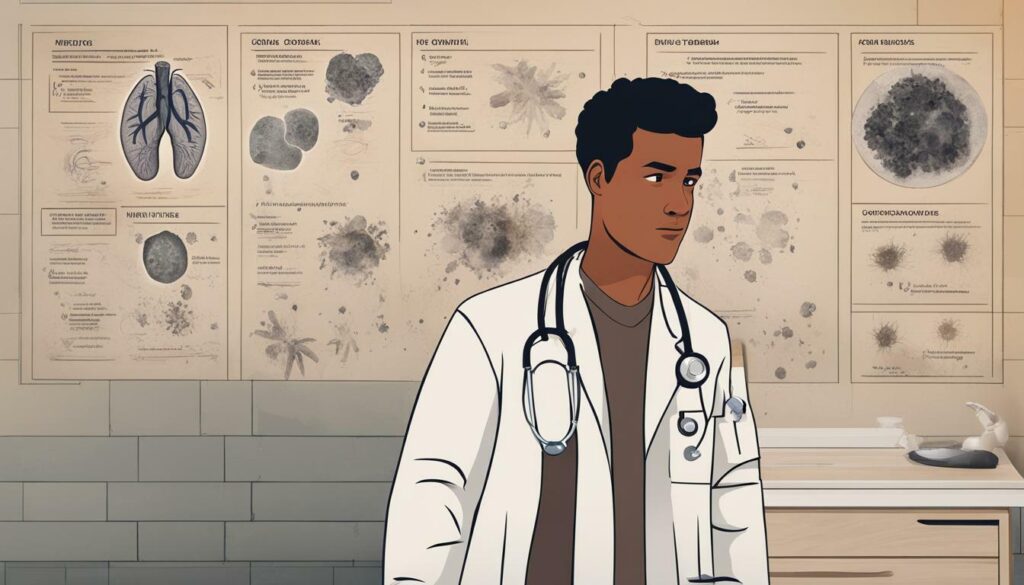

Prevention and Remediation
If you suspect that mold is making you sick, it’s essential to take action to prevent further exposure and remediate any active mold growth. Here are some tips:
- Identify and fix any sources of water intrusion, such as leaks or condensation.
- Ensure proper ventilation in high-humidity areas such as bathrooms and kitchens.
- Clean and dry any areas affected by water damage within 24-48 hours.
- Use mold-resistant products for any repairs or renovations.
- Regularly clean and maintain HVAC systems, air filters, and dehumidifiers.
- Consider hiring a professional mold remediation company for large or extensive mold problems.
By following these preventive measures, you can significantly reduce your risk of mold-related health problems.
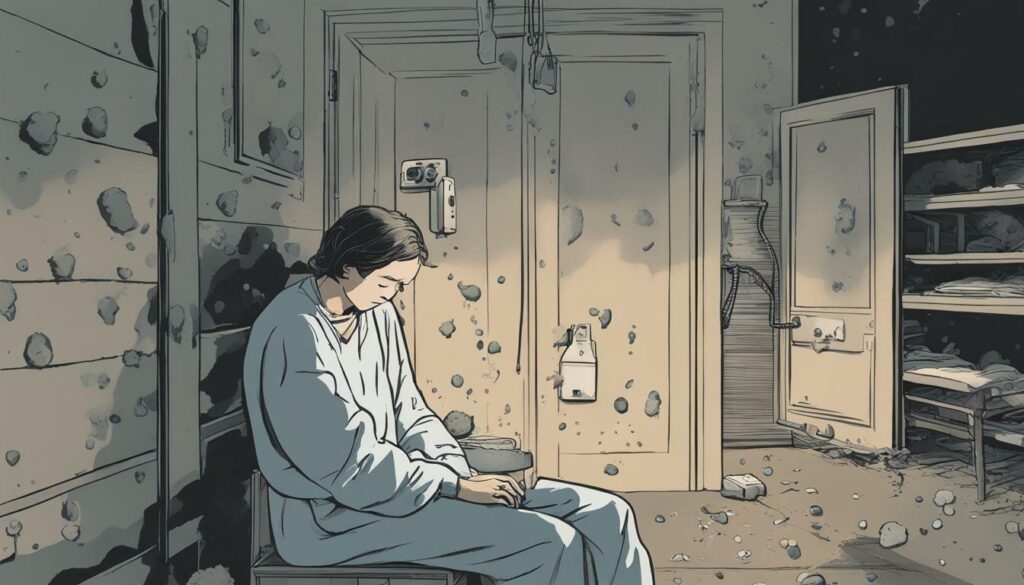

Remember, prevention is the key to minimizing your risk of mold-related health problems. By staying vigilant, addressing any water damage or moisture issues promptly, and seeking professional help if necessary, you can protect yourself and your loved ones from the harmful effects of mold.
Environmental Factors
Mold growth can occur in a variety of environmental conditions, making it essential to take proactive measures to prevent mold-related health problems. Excess humidity, water leaks, and poor ventilation can all contribute to the growth of mold in your home or workplace.
Reducing humidity levels to below 60% can greatly decrease the risk of mold growth, so investing in a dehumidifier can be a wise choice. Regularly inspecting your home or workplace for water leaks is also crucial, as even a small leak can lead to mold growth over time. Additionally, ensuring proper ventilation in areas with high moisture, such as bathrooms and kitchens, can help prevent mold from taking hold.
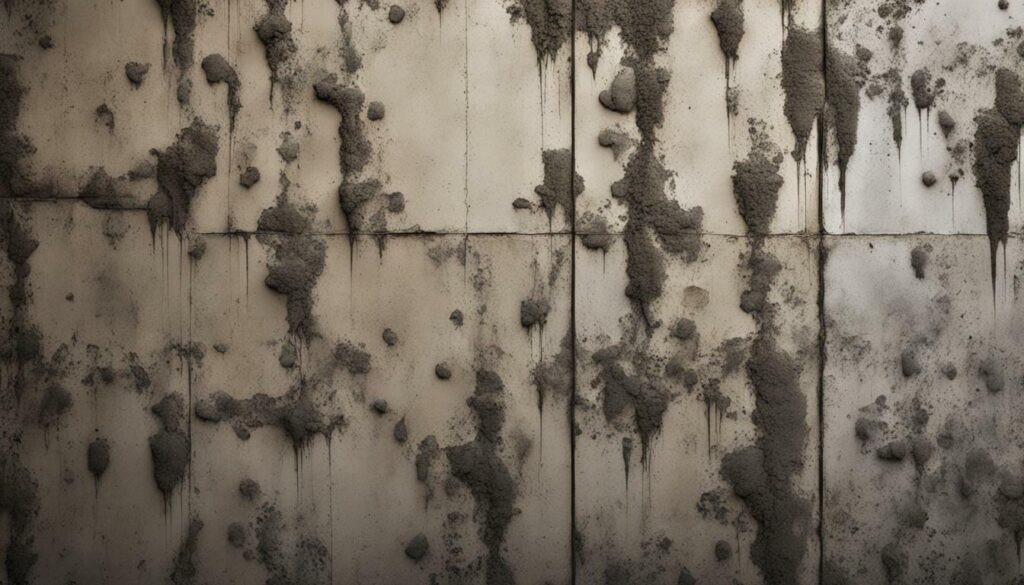

By being aware of the environmental factors that contribute to mold growth and taking action to minimize them, you can create a healthy living and working environment. This proactive approach can help prevent mold-related health problems and promote a happier, healthier life.
Living with Mold Sensitivity
If you are one of the many individuals who experience mold sensitivity, it’s essential to take proactive steps to manage your symptoms and minimize your exposure to mold. Here are some helpful tips:
- Avoid high-risk environments. If possible, avoid spending time in areas with known mold problems, such as old buildings or damp basements.
- Minimize outdoor exposure. Mold is present in the air outside, especially in humid climates or after rainfall. Limit your time outdoors during wet weather or high humidity, and check your local pollen and mold counts before venturing outside.
- Create a mold-free living environment. Keep your home clean and dry, and promptly address any water leaks or moisture problems. Use a HEPA filter to trap mold spores in your air ducts, and consider investing in an air purifier specifically designed for mold allergies.
- Take precautions during home renovations. If you are planning a renovation, make sure you work with a contractor who is knowledgeable about mold prevention and remediation. Make sure all materials are properly stored and ventilated to prevent mold growth.
- Consult with your doctor. If you experience persistent mold symptoms, speak with your doctor about potential treatment options or referral to a specialist.
Living with mold sensitivity can be challenging, but by taking these steps, you can manage your symptoms and enjoy a healthy, mold-free environment.


Conclusion
By now, you should have a better understanding of the symptoms and health effects of mold exposure. It’s important to be aware of the signs early on to protect yourself and your loved ones from potential health risks.
If you suspect that mold is making you sick, don’t hesitate to seek medical help. Your healthcare provider can diagnose and treat mold-related illnesses, as well as offer advice on preventive measures to reduce your risk of exposure.
Prevention is key when it comes to mold-related illnesses. Keep your home or workplace dry and well-ventilated to minimize the risk of mold growth. Address any water leaks or moisture issues promptly, and be sure to clean up any mold as soon as you spot it.
Stay Informed and Stay Safe
Remember, being informed about the symptoms and health effects of mold exposure is crucial for your well-being. Stay up-to-date on preventive measures, seek medical help when needed, and take steps to create a mold-free living environment.
By staying informed and taking action, you can protect yourself and your loved ones from the potential health risks associated with mold. Stay safe and healthy!
FAQ
Q: How do you know if mold is making you sick?
A: Mold can cause a variety of symptoms, including respiratory issues, allergic reactions, skin and eye irritation, and neurological symptoms. If you are experiencing any of these symptoms and suspect mold exposure, it is essential to seek medical attention.
Q: What are the health effects of mold exposure?
A: Mold exposure can lead to a range of health effects, including respiratory problems, allergies, skin and eye irritation, neurological symptoms, fatigue, immune system suppression, and even long-term complications such as mold-related infections.
Q: What are the symptoms of mold sickness?
A: Symptoms of mold sickness can vary, but common signs include coughing, wheezing, shortness of breath, sneezing, itching, watery eyes, skin rashes, eye irritation, headaches, dizziness, difficulty concentrating, fatigue, and immune system suppression.
Q: How can I prevent mold-related illnesses?
A: Prevention is key when it comes to mold-related illnesses. You can minimize the risk of mold growth by controlling humidity levels, addressing water leaks promptly, improving ventilation, and keeping your living spaces clean and dry. Regularly inspecting your home or workplace for potential mold sources is also important.
Q: When should I seek medical help for mold-related illness?
A: If you suspect that mold is making you sick, it is crucial to seek medical attention. You should consult a healthcare professional if you experience persistent respiratory, allergic, skin, or neurological symptoms. They can help provide a proper diagnosis and recommend appropriate treatment options.


